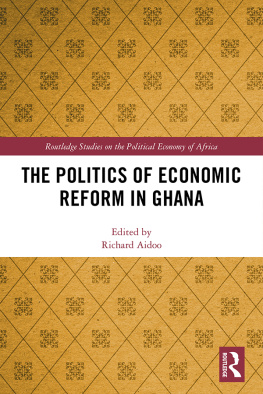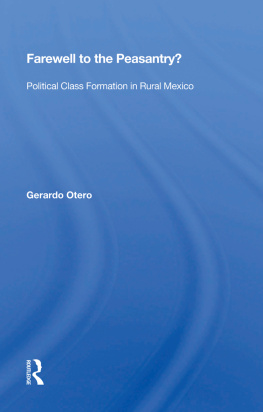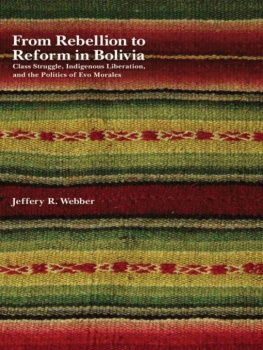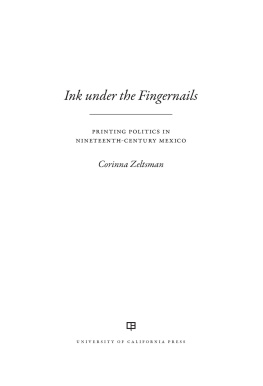2015 by Vanderbilt University Press
Nashville, Tennessee 37235
All rights reserved
First printing 2015
This book is printed on acid-free paper.
Manufactured in the United States of America
Library of Congress Cataloging-in-Publication Data on file
LC control number 2014019560
LC classification number F1231.5.B75 2014
Dewey class number 972.04092dc23
ISBN 978-0-8265-2044-9 (hardcover)
ISBN 978-0-8265-2046-3 (ebook)
Acknowledgments
The past decade in which this book took shape has constituted the most challenging and rewarding professional period thus far in my life. The sense of accomplishment cannot be overstated. While the rewards have been many, they are not mine alone. I owe an immense debt of professional and personal gratitude to those who made this journey possible.
The genesis of this project was in 2003 at the University of California, San Diego (UCSD). Over the subsequent seven years, my faculty advisors did their best to teach me the skills necessary to become a historian. Eric Van Young gave freely of his time, his counsel, and his knowledge. To say that I am fortunate to have studied under his guidance is an egregious understatement. This book owes many of its strengths and none of its shortcomings to his thorough comments on chapter drafts. Christine Hnefeldt, Michael Monten, Everard Meade, and Leon Zamosc each contributed at different stages of this projects development. In hindsight I realize how fortunate I was to have such an engaged group of Latin Americanists with whom to work at UCSD. I can only hope that this book reflects a modicum of their collective expertise.
My experience at UCSD was greatly enhanced by my community of peers in the Department of History. I give many thanks to a special group of Latin Americanists who preceded meMatthew OHara, Eddie Wright Rios, and Miriam Riggsfor sharing their accumulated wisdom and practical advice. I also owe a significant debt of gratitude to those in my cohort. Jess Prez, Miguel La Serna, Chris Wisniewski, Brbara Zepeda Corts, Ricardo Fagoaga Hernndez, and Jimmy Patio all provided me with strong moral and intellectual support that extended from the seminar room to student conferences and on to social gatherings on the pastoral grounds of student housing. Finally, many thanks to my reading group: Todd Welker, Merina Smith, Christian Gonzalez, and Kelli McCoy. They took time out of their own busy schedules to read many chapter drafts of dubious quality, always offering constructive feedback.
Since I arrived in Lubbock, my colleagues at Texas Tech University have helped me with the book. Miguel Levario, Aliza Wong, Gretchen Adams, and Karlos Hill all shared their insights about the publishing process or commented on drafts of the book proposal. Abby Swingen and Alan Barenberg listened to my questions during the course of revisions, shared their own experiences and work, and still found time to comment on a revised chapter or two. My other colleagues in the Department of History were quick to supply words of support and congratulations as the book inched closer to publication. I am grateful for such a strong showing of collegiality.
Ideas never would have been transformed into words on the printed page were it not for multiple streams of financial support during my time in San Diego and Lubbock. External funding in the form of a research fellowship from the Institute for Mexico and the United States (UC MEXUS) at the University of California, Riverside, and a Teixidor Grant from the Institute of Historical Investigations at the Autonomous National University of Mexico (UNAM) funded the bulk of my research abroad. Local support from the Department of History, the Friends of the International Center, and the Center for Iberian and Latin American Studies (CILAS) at UCSD allowed me to extend my stay in Mexico to a full calendar year. More recently, Texas Tech University has provided funding for additional research in Mexico and at archives in California and Texas. I am thankful that these organizations saw sufficient potential in my project to provide the material means with which to bring it to fruition.
Getting to Mexico, let alone successfully navigating the archives, would not have happened without a great deal of intellectual and practical support from academics, professionals, and friends in Mexico City, Guadalajara, and Tepic. Professor Antonio Escobar Ohmstede at the Centro de Investigaciones y Estudios Superiores en Antropologa Social (CIESAS) provided much-needed advice regarding the organization of my archival visits in Mexico City, in particular facilitating my access to the Archivo de Defensa Nacional (ADN). Othn Nava Martnez, whom I first met during a preliminary research trip in 2005, placed his vast knowledge of the citys archives at my disposal, further inviting me into a community of historians that included Miguel ngel Hernndez and Claudia Ceja Andrade. In Tepic, I met a thriving community of local historians who share my fascination with Manuel Lozada. I thank them, in particular Pedro Lpez Gonzlez, Jess Juregui, and Enrique de Aguinaga Corts, for inviting me into their conversations. No one opened his or her door so widely, however, as Joe Uberuaga, who first let me impose upon his hospitality in 2003 as a favor to his great-niece, Micaela. Little did he know that I would return on multiple occasions for extended stays, frequently regaling (or was it boring?) him with tales from the archives while liberating an apparently endless supply of papaya and coffee from his kitchen.
In Mexico City, archivists and the support staffs at the Archivo General de la Nacin (AGN), the ADN, the Fondo Reservado of the Biblioteca Nacional (BN), the Mapoteca Orozco y Berra, and the Archivo Miguel Lerdo de Tejada tolerated my imperfect Spanish and did everything in their power to make my investigations as efficient as possible. Special thanks go to Professors Linda Arnold and Patrick Timmons for freely sharing some of their hard-earned research and experience with such an inexperienced gringo at the AGN. Thanks also to the librarians at the Instituto de Investigaciones Histricas and the Instituto Mora who provided access to their considerable libraries. In Guadalajara, Alejandro Telles Vzquez made the Archivo Histrico de Jalisco (AHJ) feel like a second home. I am also quite grateful to the personnel at the Biblioteca Pblica del Estado de Jalisco (BPEJ) and the Archivo del Arzobispado de Guadalajara (AAG) for treating me so kindly, even as my limited time in Guadalajara ran out.
I thank my parents, Ted and Peggy, for teaching me about perseverance and how to embrace challenges with civility and grace. I may have spent much of the past decade training to become a specialist in a field of the humanities, but they long ago helped me develop the moral compass that guides me to this day. Nearly fifteen years ago, I met the person without whom this particular adventure never would have begun. Kelly Ainsworth introduced me to study abroad and Latin America when I was an undergraduate at Willamette University and later encouraged me to pursue history as a profession. I hope to capture in my own career a small part of the joy and humanity with which Kelly lived and worked. And, finally, I thank Micaela, who has been brave enough to seek new adventures with me in San Diego and Lubbock, pursuing her own professional path while helping me to achieve mine. Micaela has also shouldered disproportionate responsibility in the raising of our young daughters, Amaia and Isabel, while Daddy finished his book. Although my emotional debt can neither be quantified nor settled in so few lines, suffice it to say that I am forever grateful for her unwavering love and support.







